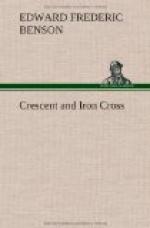For centuries before the Osmanli Turks made their appearance in Asia Minor, there had come from out of the misty East numerous bodies of Turks, pushing westwards, and spreading over the Euphrates valley and over Persia, in nomadic or military colonisations, and it is not until the thirteenth century that we find the Osmanli Turks, who give their name to that congregation of races known as the Ottoman Empire, established in the north-west corner of Asia Minor. Like all previous Turkish immigrations, they came not in any overwhelming horde, with sword in one hand and Koran in the other, but as a small compact body with a genius for military organisation, and the gift, which they retain to this day, of stalwart fighting. The policy to which they owed their growth was absorption, and the people whom they first began to absorb were Greeks and other Christians, and it was to a Christian girl, Nilufer, that Osman married his son Orkhan. They took Christian youths from the families of Greek dwellers, forced them to apostatise, gave them military training, and married them to Turkish girls. It was out of this blend of Greek and Turkish blood, as Mr. D.G. Hogarth points out, that they derived their national being and their national strength. This system of recruiting they steadily pursued not only among the Christian peoples with whom they came in contact, but among the settlements of Turks who had preceded them in this process of pushing westwards, and formed out of them the professional soldiery known as Janissaries. They did not fight for themselves alone, but as mercenaries lent their arms to other peoples, Moslem and Christian alike, who would hire their services. This was a policy that paid well, for, after having delivered some settlement from the depredations of an inconvenient neighbour, and with their pay in their pocket, they sometimes turned on those who had hired their arms, took their toll of youths, and finally incorporated them in their growing empire. Like an insatiable sponge, they mopped up the sprinklings of disconnected peoples over the fruitful floor of Asia Minor, and swelled and prospered. But as yet the extermination of these was not part of their programme: they absorbed the strength and manhood of their annexations into their own soldiery, and came back for more. They did not levy those taxes paid in the persons of soldiers for their armies from their co-religionists, since Islam may not fight against Islam, but by means of peaceful penetration (a policy long since abandoned) they united scattered settlements of Turks to themselves by marriages and the bond of a common tongue and religion.




